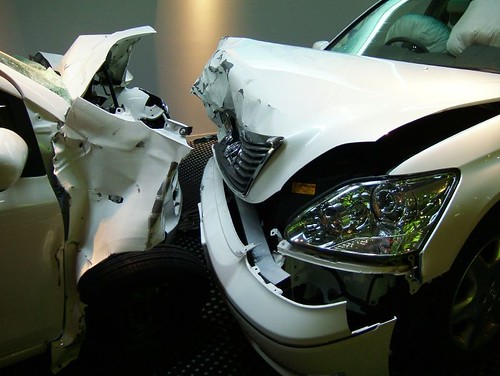As I mentioned in an earlier article, our new car got into an accident on our vacation driving down to Virginia. The weather had recently turned to rain. We were driving along the highway below the speed limit making sure to keep a safe distance from the car in front. Suddenly traffic slowed down so we did as well. Then I saw it coming in the rear-view mirror – BAMM!! We just got hit from behind. The force was enough to throw us forward. I moved to avoid the car in front but ended up clipping his fender. All three cars pulled off to the side of the road. Thank goodness no one was hurt! The kids were shaken up (heck, we were all shaken up) but we were OK. I got out and assessed the damage. Man I didn’t realize how bad we were hit. Back door was crunched inward. At first I couldn’t even open it. Our front has a small dent as well. The other two cars – scratches at best. It was an SUV Oreo and our poor mini van was the creamy middle.
Still a bit frazzled from the accident the other two drivers and I began to exchange automobile insurance information. The person who hit me was in a rush to leave. He didn’t think we needed to call the police since no one was hurt and we were exchanging info already. Something didn’t feel right about this to me. Thankfully, I listened to my Spidey sense and called the police. A few minutes later an officer arrived and took all of our information.
What A Police Officer Does At The Accident
- The officer took all of our pertinent information and heard separate descriptions of what happened from each of us. This was good because the officer gave us each a Driver Information Exchange Report which listed car insurance information, driver’s license #, address, phone number, car description VIN, and more. After an accident it’s easy for a driver to forget to get a piece of information or write something down incorrectly. Getting this from a police officer helps to prevent that.
- I didn’t know it at the time but you could be given a ticket for driving too close and causing an accident (at least where I was). This may have been one of the key reasons the driver who hit me wanted to leave. It ends up the officer gave him a written warning. This is very important in that it gives official evidence that the officer felt it was the driver’s fault for causing the accident! This will help in determining the fault for the insurance companies which will lead to me getting back my car insurance deductible from repairs on my accident claims (my deductible is $1000).
- The officer filed a police report for the accident. The insurance companies will use this as well in determining the fault. Without getting a police report you run the risk of a driver changing his story after the fact and it becomes an issue of his word against yours. Again this will help in getting my deductible back.
- Having an officer there helps keep everyone’s heads level. Things can get heated when there’s an accident. I’d rather have the officer do the peace keeping than worry about it myself. Also, I want to believe in the best in people but I don’t know the person who hit me from Adam. An officer can confirm that this isn’t a criminal. A little paranoid? Yes. Does it give me additional peace of mind at a stressful moment? Heck yeah!
As you can see calling the police was important. With the written warning and the police report the automobile insurance company should see that the fault was on the other driver. This will save me my insurance deductible of $1000. Had I not called it could possibly cost me that $1000!



 Are you just starting off building up your savings? I’ve mentioned before that a great way to save is by putting money in a
Are you just starting off building up your savings? I’ve mentioned before that a great way to save is by putting money in a 